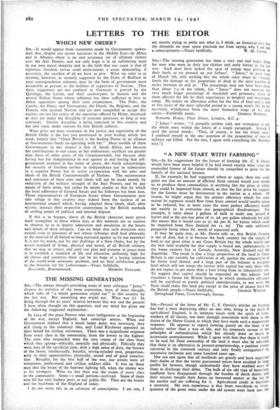SIR,—The missing generation has been a very real and tragic
thing for men who were in their late thirties and early forties in the last war. Such men have lacked the spur of young men pressing on their heels, as we pressed on our fathers'. " Janus," in your issue of March 7th, tells nothing like the whole story when he virtually limits the damage to the proportion of dead to the total number of males between 20 and 5o. The percentage may not have been more than about 7.5 of the whole, but " Janus " does not mention the very much larger percentage of wounded and prisoners, many of them affected for life by their experiences in hospital and internment camp. He makes no allowance either for the loss of four and a half to five years of the most splendid period in a young man's life by his necessary withdrawal from the most formative stage of his civil
["Janus " writes: " I certainly neither told, nor attempted to tell, the whole story within the limits of a single paragraph. Indeed, I used the actual words: 'That, of course, is not the whole story.' I confined myself to the one question of the proportion of men of military age killed. For the rest, I agree with everything Mr. Robbins says."]






























 Previous page
Previous page